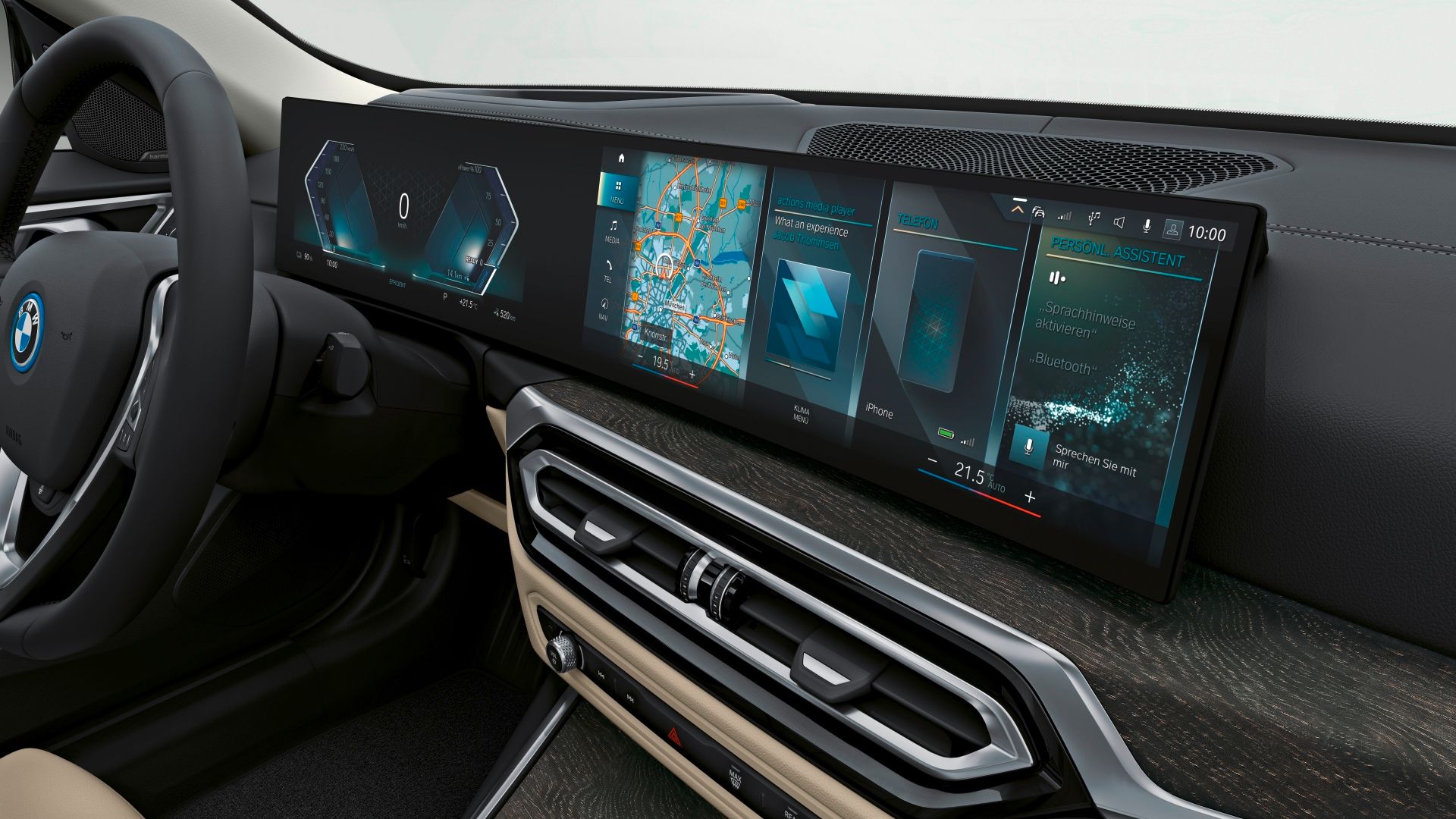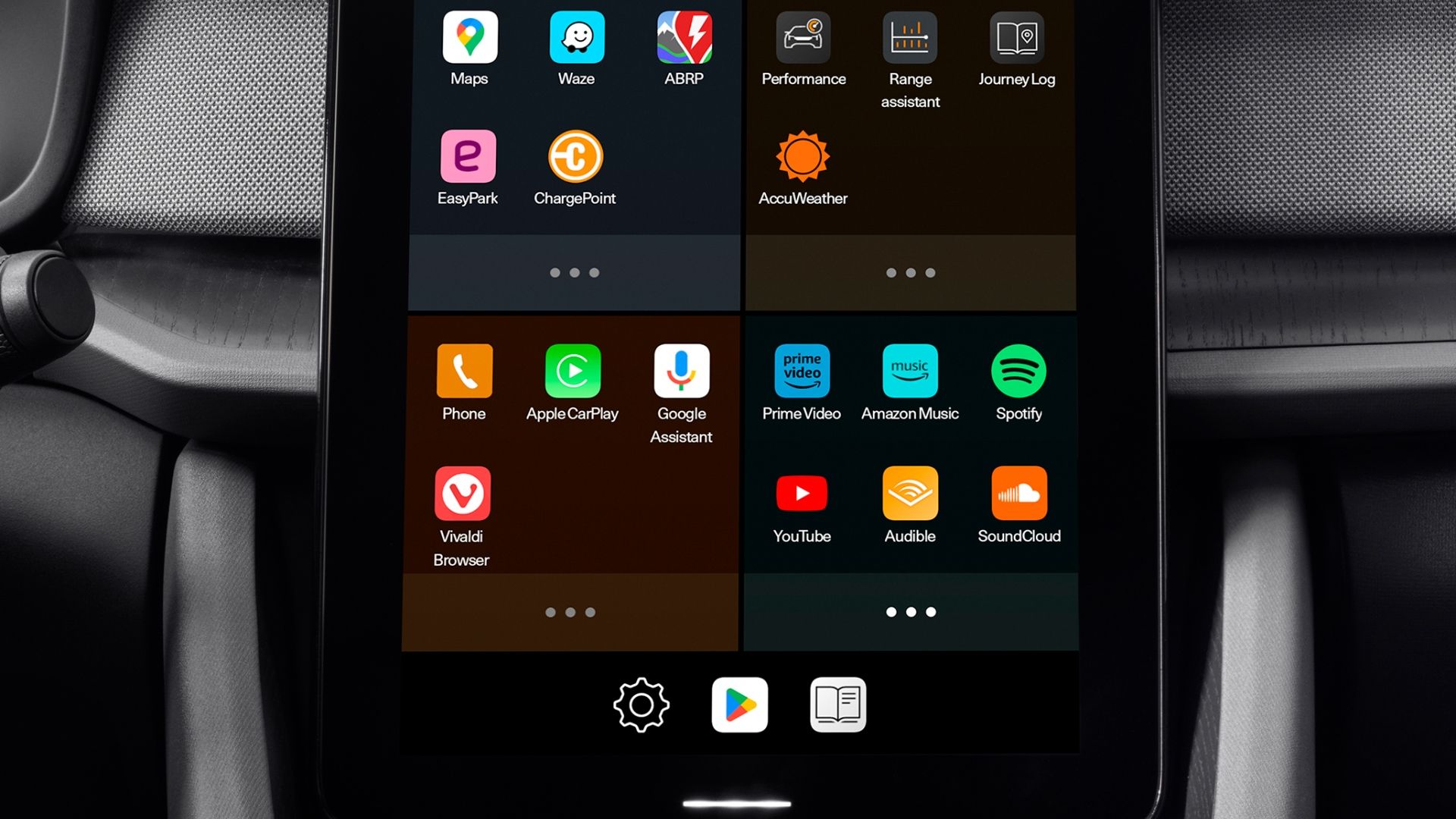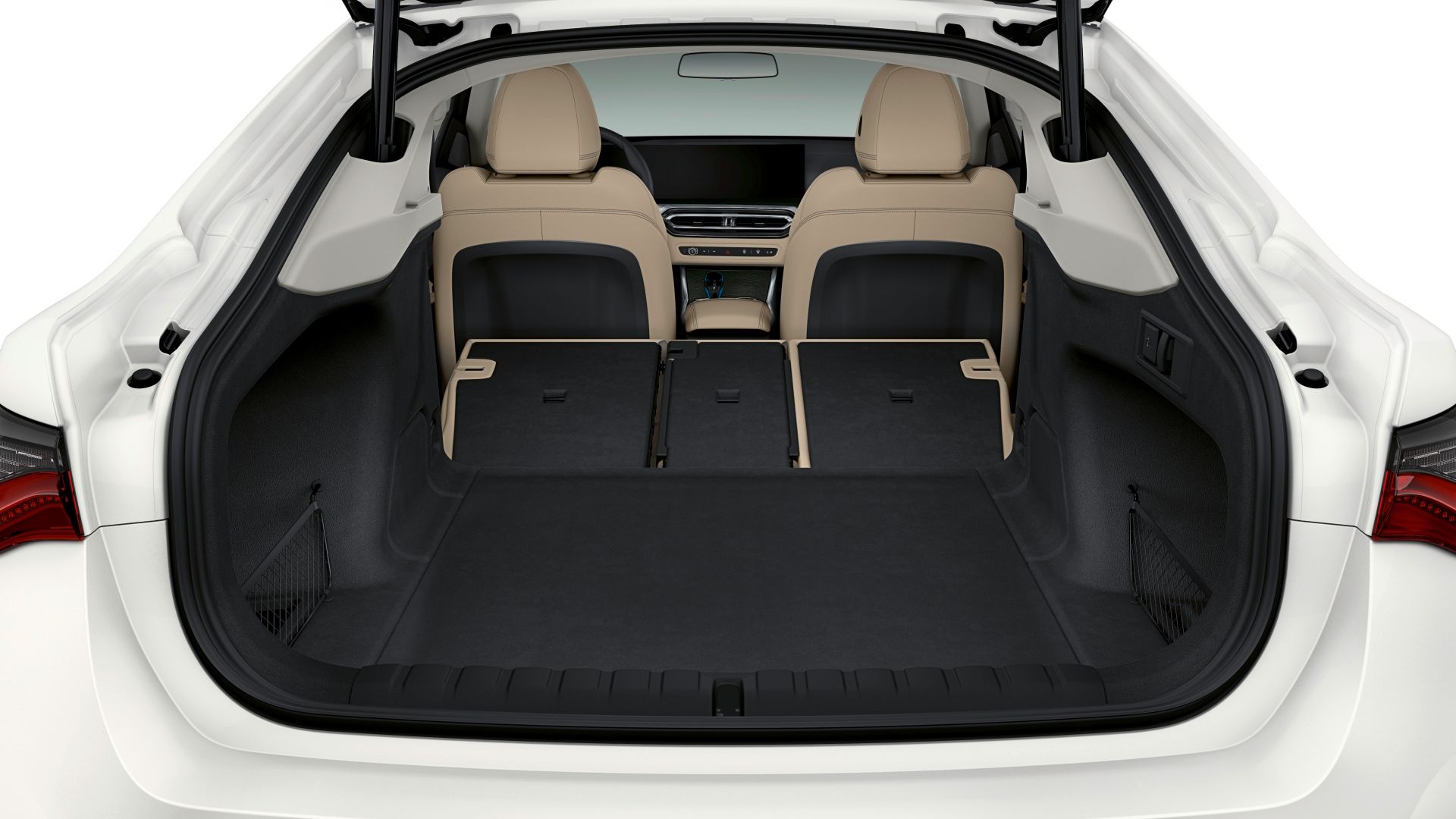-
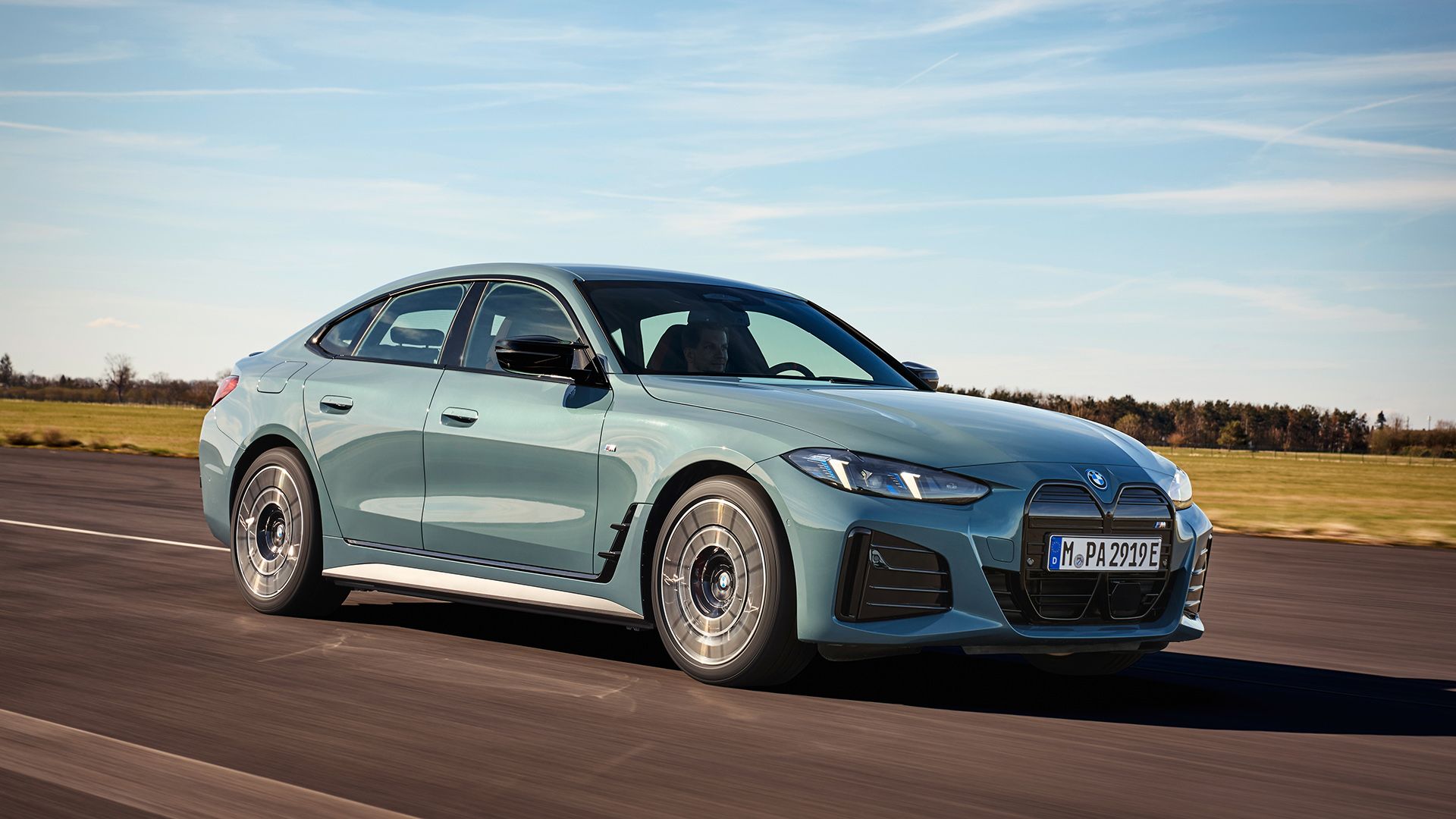
2024 BMW i4
The BMW i4 is a mid-size executive electric liftback sedan based on the current-generation 4 Series. Interestingly, it is the only EV based on the brand’s niche Grand Coupe model line. It’s available in the USA with four different drivetrain options, including the base eDrive35, eDrive40, xDrive40, and flagship M50.
Pros- Sleek and sporty design
- i4 M50 hits 60 MPH in 3.7 seconds
- Tech-packed interior
- Plenty of cargo space with the seats down
Cons- Poor range for the AWD models
- Higher starting price than the Polestar 2
-
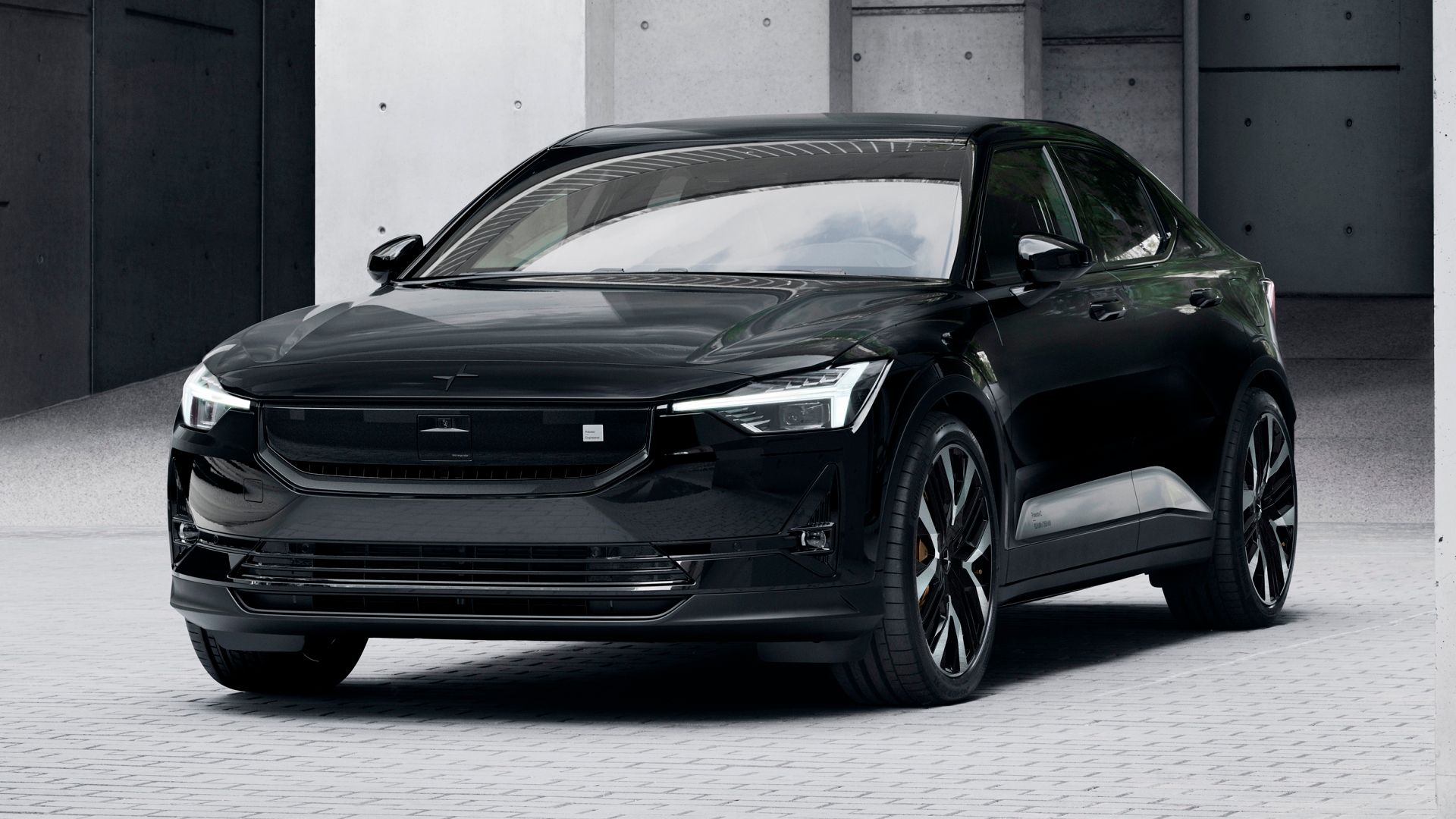
2024 Polestar 2
The Polestar 2 is the Swedish EV manufacturer’s entry-level electric car offering. Design-wise, it takes the form of a crossover with sedan proportions, making it a fairly unique option in the segment. Polestar offers a choice of a base rear-wheel drive single-motor or Performance dual-motor all-wheel drive variant, with power outputs ranging between 299 and 455 horsepower.
Pros- Starting price under $50,000
- Up to 320 miles on a single charge
- Impressive Dual-Motor Performance trim
- RWD and AWD trims available
Cons- Relatively tame exterior styling
- Vertical infotainment touchscreen looks odd
BMW needs no introduction as one of the most recognizable names in the automotive world, and a somewhat surprising early adopter of the EV movement. Since the debut of the BMW i3 over a decade ago, the company has continued to innovate and add to its EV lineup, releasing the i4 in 2022. The all-electric sedan is a luxury EV that comes in a multitude of trims, including rear-wheel drive (RWD) base models and high-performance all-wheel drive (AWD) M-Sport editions alike.
Polestar, on the other hand, is a relative newcomer to the automotive industry as a whole, as well as the EV space. After being acquired by Volvo in 2015, the Polestar brand split from the parent company in 2020 with the release of its flagship EV, the Polestar 2. Like the BMW, the Polestar 2 is available with RWD and AWD trims and offers everything from a basic powertrain to something far more impressive. A luxury sedan designed to hold its own against the top brands in the segment, let’s see how the Polestar 2 can stand up against the i4.
In order to bring you the most up-to-date and accurate comparison possible, we’ve relied on information sourced from Polestar, BMW, Fueleconomy.gov, NHTSA, IIHS, and hands-on experience. For information regarding our ranking and grading procedures, please refer to our methodology policy.
Performance And Capability
The base model version of both the BMW i4 and Polestar uses a single-motor RWD powertrain. The i4 eDrive35 produces 282 horsepower and 295 pound-feet of torque and is the only version of the BMW EV that uses a 70.2 kilowatt-hour (kWh) battery. This powertrain is enough to push the base i4 from 0 to 60 miles per hour (MPH) in 5.8 seconds. The base model Polestar 2 is just called the Single-Motor setup, and, together with a 79.0 kWh battery, this single electric motor pumps out 299 horsepower and 361 pound-feet. The Polestar 2 is just a tick slower than the i4, taking 5.9 seconds to reach 60 MPH.
Base Powertrain Comparison
-
2024 BMW i4 2024 Polestar 2 Model BMW i4 Polestar 2 Engine Single- or dual-electrically excited synchronous motors Single- or dual-permanent-magnet motors Transmission Single-speed automatic Single-speed automatic Horsepower 282-536 HP 299-455 HP Torque 295-586 LB-FT 361-546 LB-FT Driveline Rear- or all-wheel drive rear- or all-wheel drive Range 227-307 miles 247-320 miles Fuel Economy 80-120 MPGe 95-115 MPGe Charge Time 7-8 hours @ 240V 8 Hours @ 240V 0-60 MPH 5.8-3.7 seconds 5.9-4.1 seconds
The next trim BMW i4 is the Drive40, which also uses a single-motor setup on the rear axle to produce 335 horsepower and 317 pound-feet of torque. Together with a larger 83.9 kWh battery that’s used in the rest of the i4 models, the eDrive40 can reach 60 MPH in 5.4 seconds. From there, the i4 xDrive40 is an AWD model that uses a dual-motor electric setup to make 396 horsepower and 443 pound-feet of torque, enough to hit 60 MPH in 4.9 seconds. At the top of the i4 food chain is the M50 M-Sport edition, which pumps out 536 horsepower and 586 pound-feet of torque. This sporty version of the sedan rockets from 0 to 60 MPH in just 3.7 seconds.
There are two other models of the Polestar 2, the standard Dual-Motor and the Dual-Motor Performance, both of which use a 75.0 kWh battery. The regular Dual-Motor trim makes 421 horsepower and 546 pound-feet of torque, enabling the Polestar to go from 0 to 60 MPH in 4.3 seconds. Upgrading to the Dual-Motor Performance trim brings out 34 extra ponies, which is enough to bring the 0 to 60 time down to 4.0 seconds, a few tenths slower than the BMW i4 M50.
Full Performance Specifications
|
Polestar 2 Single-Motor |
Polestar 2 Dual-Motor |
Polestar 2 Dual- Motor Performance |
BMW i4 eDrive35 |
BMW i4 eDrive40 |
BMW i4 xDrive40 |
BMW i4 M50 |
|
|
Engine |
Single permanent- magnet motor |
Dual permanent- magnet motors |
Dual permanent- magnet motors |
Single electric motor |
Single electric motor |
Dual electric motors |
Dual electric motors |
|
Transmission |
1-Speed |
1-Speed |
1-Speed |
1-Speed |
1-Speed |
1-Speed |
1-Speed |
|
Horsepower |
299 HP |
421 HP |
455 HP |
282 HP |
335 HP |
396 HP |
536 HP |
|
Torque |
361 LB-FT |
546 LB-FT |
546 LB-FT |
295 LB-FT |
317 LB-FT |
443 LB-FT |
586 LB-FT |
|
Battery |
79.0 kWh Net |
75.0 kWh Net |
75.0 kWh Net |
70.2 kWh Net |
83.9 kWh Net |
83.9 kWh Net |
83.9 kWh Net |
|
Driveline |
RWD |
AWD |
AWD |
RWD |
RWD |
AWD |
AWD |
|
Fuel Economy (CMB) |
111-115 MPGe |
102-106 MPGe |
95 MPGe |
110-120 MPGe |
100-109 MPGe |
99-109 MPGe |
80-95 MPGe |
|
Range |
307-320 Miles |
266-276 Miles |
247 Miles |
252-276 Miles |
283-301 Miles |
279-307 Miles |
227-269 Miles |
|
0-60 MPH |
5.9 Seconds |
4.3 Seconds |
4.0 Seconds |
5.8 Seconds |
5.4 Seconds |
4.9 Seconds |
3.7 Seconds |
|
Top Speed |
127 MPH |
127 MPH |
127 MPH |
118 MPH |
118 MPH |
124 MPH |
140 MPH |
Fuel Economy
The BMW i4 might outperform the Polestar 2 when it comes to acceleration and quickness, but the Polestar puts up a much better fight in terms of fuel economy. Putting the base models head-to-head, the BMW i4 eDrive35 gets a combined 110-120 miles per gallon equivalent (MPGe), while the Polestar 2 Single-Motor gets 111-115. The mid-tier Polestar gets about 102-106 MPGe, while the two mid-tier i4 models get 99-109 MPGe. When it comes to high-performance trims, the BMW i4 M50 averages 80-95 MPGe and the Polestar 2 Dual-Motor Performance gets 95 MPGe.
|
Model |
Polestar 2 Single-Motor |
Polestar 2 Dual-Motor |
Polestar 2 Dual- Motor Performance |
i4 eDrive35 |
i4 eDrive40 |
i4 xDrive40 |
i4 M50 |
|
City |
119-124 MPGe |
108-112 MPGe |
100 MPGe |
111-122 MPGe |
100-109 MPGe |
98-107 MPGe |
79-94 MPGe |
|
Highway |
102-106 MPGe |
96-100 MPGe |
90 MPGe |
107-119 MPGe |
99-108 MPGe |
100-111 MPGe |
80-98 MPGe |
|
Combined |
111-115 MPGe |
102-106 MPGe |
95 MPGe |
110-120 MPGe |
100-109 MPGe |
99-109 MPGe |
80-95 MPGe |
|
Range |
307-320 Miles |
266-276 Miles |
247 Miles |
252-276 Miles |
283-301 Miles |
279-307 Miles |
227-269 Miles |
Interior Design And Technology
The cabin of the BMW i4 is roomy, luxurious, and loaded with all the creature comforts you’d expect from a BMW at this price point. Higher-tiered trims have available rose gold trim, wooden accents, and white upholstery to take the luxury up a notch, while all models have heated seats and a heated steering wheel standard. A big screen dominates the vast majority of the dash in the front, while back seat occupants are treated to more room than you might think for a sporty BMW.
In the Polestar 2, a vertical infotainment center touchscreen looks a little out of place compared to the BMW, but it doesn’t take too much away from the luxury feel of the sedan. Smooth dashboard lines and wooden accents throughout give the Polestar’s cabin a high-end feel, while both rows of seats offer plenty of headroom and legroom for all passengers. Heated front seats are standard and buttons on the steering wheel make infotainment control easy and intuitive.
BMW i4 vs. Polestar 2 Technology Comparison
Similar to its all-electric SUV brother the iX and the all-new M4 CS coming out next year, the BMW i4 has a massive all-digital dashboard comprising a 12.3-inch digital instrument cluster and a large 14.9-inch infotainment touchscreen. Coming standard with wireless Apple CarPlay and Android Auto, smartphone integration is a breeze, and a Wi-Fi hotspot makes it easy to stay connected on the go.
Drivers of the Polestar 2 are also treated to a 12.3-inch digital gauge cluster behind the steering wheel, but the infotainment center touchscreen is an 11.2-inch unit mounted vertically in the center of the dashboard. While functional, it’s not quite as sleek as what the i4 has. The Polestar 2 uses a native Android Automotive operating system as the basis of its tech, so connecting a smartphone via Android Auto is easy. The infotainment center groups similar apps into quadrants on the screen, making it easier to find the app you’re looking for.
Interior Room And Cargo Capacity
One of the knocks on the BMW i4 is its relatively lackluster rear storage space with the back seats up, offering just 10.0 cubic feet compared to the 14.3 cubic feet available in the Polestar 2. But once the rear seats are laid down, the i4 has an impressive 45.6 cubic feet of space, outdoing the 38.7 cubic feet you’ll find in the Polestar.
Cargo Space Comparison
|
Vehicle |
BMW i4 |
Polestar 2 |
|---|---|---|
|
Standards Capacity |
10.0 Cubic-Feet |
14.3 Cubic-Feet |
|
Seats Laid Down |
45.6 Cubic-Feet |
38.7 Cubic-Feet |

Add TopSpeed to your Google News feed.
Safety And Reliability
Although Polestar itself is relatively new to the auto industry, its parent company, Volvo, has been producing safe and reliable vehicles for decades. That’s why it was no surprise when the new Polestar 2 earned perfect 5-star safety ratings across the board from the National Highway Traffic Safety Administration (NHTSA). As for the BMW i4, the brand’s history speaks for itself in terms of safety and reliability as one of the longest-standing names in the luxury vehicle space. That said, the i4 has not yet been tested or rated by the NHTSA, but that’s not uncommon for newer cars in this price range.
BMW i4 Safety
The BMW i4 has not been crash-tested by the IIHS, so we’ve included the Euro NCAP crash test video for reference. Keep in mind that European safety standards and specifications vary greatly compared to those in the US.
NHTSA 5-Star Safety Ratings
|
Overall Rating |
Not Rated |
|
Overall Front Crash Rating |
Not Rated |
|
Overall Side Crash Rating |
Not Rated |
|
Rollover Rating |
Not Rated |
- Recalls (NHTSA): 1 recall about the potential for the battery to overheat. Dealers will replace the module at no charge.
- NHTSA Investigations: 0
- NHTSA Consumer Complaints: 4 complaints relating to the electrical system, suspension, brakes, and speed control
Polestar 2 Safety
Just like with the BMW i4 above, the Polestar 2 has not been tested or rated by the IIHS, so we’re including the Euro NCAP crash test video only as a reference since European safety standards are not equivalent to those in the US.
NHTSA 5-Star Safety Ratings
|
Overall Rating |
5 out of 5 |
|
Overall Front Crash Rating |
5 out of 5 |
|
Overall Side Crash Rating |
5 out of 5 |
|
Rollover Rating |
5 out of 5 |
- Recalls (NHTSA): 0
- NHTSA Investigations: 0
- NHTSA Consumer Complaints: 2 complaints related to the electrical system and windshield wipers
Reliability Comparison
Interestingly, the two European brands offer identical warranties on the BMW i4 and the Polestar 2, signaling the reliability found in both. These warranties include bumper-to-bumper coverage for 4 years/50,000 miles, roadside assistance for the life of the warranty, corrosion protection for 12 years with no mileage limit, and industry-standard battery coverage of 8 years/100,000 miles. Across the board, this warranty is about as average as you’ll find in the industry; it’s better than some but falls short of what other brands offer.
Warranty
|
Vehicle |
BMW i4 |
Polestar 2 |
|---|---|---|
|
Basic Warranty |
4 Years / 50,000 Miles |
4 Years / 50,000 Miles |
|
Battery Warranty |
8 Years / 100,000 Miles |
8 Years / 100,000 Miles |
|
Corrosion Warranty |
12 Years / Unlimited Miles |
12 Years / Unlimited Miles |
|
Roadside Assistance |
4 Years / Unlimited Miles |
4 Years / Unlimited Miles |
Pricing And Availability
Getting into a new Polestar 2 is cheaper than a BMW i4, with the Single-Motor trim costing just $49,900, the only option from either lineup that starts under $50,000. The entry-level BMW i4 eDrive35 starts at $52,200, while the other single-motor eDrive40 has a $57,300 price tag. Upgrading to the Dual-Motor Polestar 2 will set you back $55,300, while the dual-motor xDrive40 is $61,600. The Dual-Motor Performance Polestar 2 has a starting price of $63,000, while the M-Sport BMW i4 M50 is $69,700.
Trim Pricing Comparison
|
BMW i4 |
Polestar 2 |
|||
|---|---|---|---|---|
|
Trim |
Price |
Trim |
Price |
|
|
i4 eDrive35 |
$52,200 |
Single-Motor |
$49,900 |
|
|
i4 eDrive40 |
$57,300 |
Dual-Motor |
$55,300 |
|
|
i4 xDrive40 |
$61,600 |
Dual-Motor Performance |
$63,000 |
|
|
i4 M50 |
$69,700 |
|||

